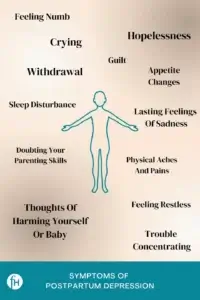
Thank you for reading this post, don't forget to subscribe!
Postpartum Depression is more than just baby blues. It is a mental condition which if left unchecked can have serious consequences to both mother and child. Most women do not even know that such a disorder exists. They just find themselves losing interest in things around them and sometimes, hating their child. It is important that every woman is educated on the symptoms, causes and treatment.
Meaning of Postpartum
Postpartum depression is a type of depress that occurs after childbirth. It is a form of mood disorder that affects women and can begin anytime within the first year of birth. It is a condition usually accompanied by mood swings, anxiety, and sadness. Postpartum depression interferes with a woman’s ability to care herself and her child. disappears a few weeks after childbirth.
Postpartum Symptoms
- Sadness and hopelessness
Loss of energy
Difficulty bonding with the baby.
Irritability
Difficulty concentrating
Loss of interest
Thoughts of self-harm.
Postpartum hemorrhage
Urinary problems.
Change of bowel habits

Causes of Postpartum
The exact causes of postpartum depression are not really known but it is believed to be a combination of physical, emotional, and social factors. Also, hormonal changes are believed to be a key factor. Other factors include:
- History of depression
Lack of support
Stressful events
Family history of mental health disorders
Previous cases of postpartum depression.
Postpartum Treatment and Care
- Medical checkups.
Regular visits are needed to monitor the mother’s recovery.
- Pain management.
Women may need pain medications to manage pain especially if there was a cesarean section.
- Emotional support.
In this crucial time, support is needed from partners, family members, and support groups.
- Adequate rest and self-care.
Rest is needed during this period for recovery. Women need to prioritize sleeping, eating healthy meals, and engaging in physical activity when required.
- Proper education.
Providing information on newborn care and parenting skills can help parents understand the journey of childbirth and its aftermath. This can be in form of support groups or educational resources.
Contrary to belief, Postpartum depression is a treatable condition. During this period, it is important that women with this condition have the best care and a support system. Always seek medical help in case things seem strange to you.
ALSO READ
• ECOWAS signs a €1.3 million agroecology grant
• Aging Gracefully, Maintaining Vitality








